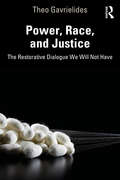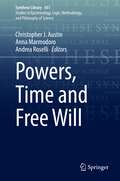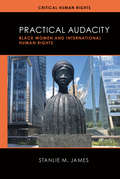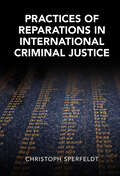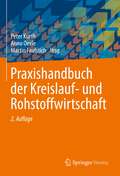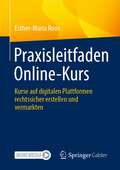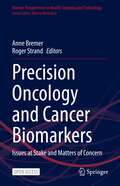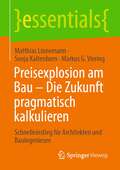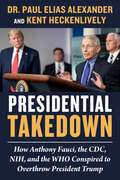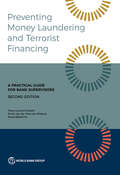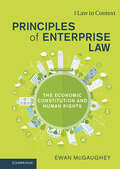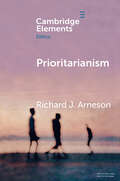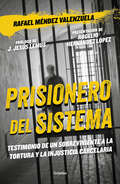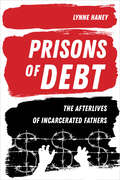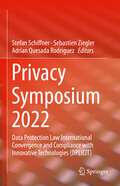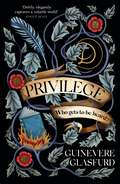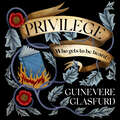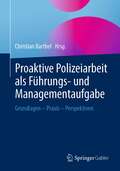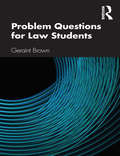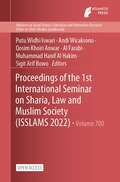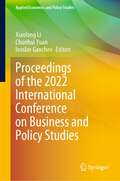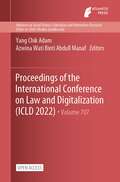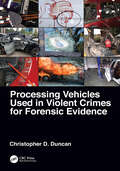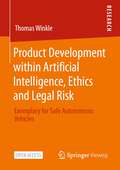- Table View
- List View
Power, Race, and Justice: The Restorative Dialogue We Will Not Have
by Theo GavrielidesWe are living in a world where power abuse has become the new norm, as well as the biggest, silent driver of persistent inequalities, racism and human rights violations. The COVID-19 socio-economic consequences can only be compared with those that followed World War II. As humanity is getting to grips with them, this timely book challenges current thinking, while creating a much needed normative and practical framework for revealing and challenging the power structures that feed our subconscious feelings of despair and defeatism. Structured around the four concepts of power, race, justice and restorative justice, the book uses empirical new data and normative analysis to reconstruct the way we prevent power abuse and harm at the inter-personal, inter-community and international levels. This book offers new lenses, which allow us to view power, race and justice in a modern reality where communities have been silenced, but through restorative justice are gaining voice. The book is enriched with case studies written by survivors, practitioners and those with direct experiences of power abuse and inequality. Through robust research methodologies, Gavrielides’s new monograph reveals new forms of slavery, while creating a new, philosophical framework for restorative punishment through the acknowledgement of pain and the use of catharsis for internal transformation and individual empowerment. This is a powerful and timely book that generates much needed hope. Through a multi-disciplinary dialogue that uses philosophy and critical theory, social sciences, criminology, law, psychology and human rights, the book opens new avenues for practitioners, researchers and policy makers internationally.
Powers, Time and Free Will (Synthese Library #451)
by Anna Marmodoro Christopher J. Austin Andrea RoselliThis book brings together twelve original contributions by leading scholars on the much-debated issues of what is free will and how can we exercise it in a world governed by laws of nature. Which conception of laws of nature best fits with how we conceive of free will? And which constraints does our conception of the laws of nature place on how we think of free will? The metaphysics of causation and the metaphysics of dispositions are also explored in this edited volume, in relation to whether they may or may not be game-changers in how we think about both free will and the laws of nature. The volume presents the views of a range of international experts on these issues, and aims at providing the reader with novel approaches to a core problem in philosophy. The target audience is composed by academics and scholars who are interested in an original and contemporary approach to these long-debated issues.Chapters [2] and [4] are available open access under a Creative Commons Attribution 4.0 International License via link.springer.com.
Practical Audacity: Black Women and International Human Rights (Critical Human Rights)
by Stanlie M. JamesGoler Teal Butcher (1925–93), a towering figure in international human rights law, was a scholar and advocate who advanced an intersectional approach to human empowerment influenced by Black women’s intellectual traditions. Practical Audacity follows the stories of fourteen women whose work honors and furthers Butcher’s legacy. Their multilayered and sophisticated contributions have critically reshaped human rights scholarship and activism—including their major role in developing critical race feminism, community-based applications, and expanding the boundaries of human rights discourse. Stanlie M. James weaves narratives by and about these women throughout the history of the field, illustrating how they conceptualize, develop, and implement human rights. By centering the courage and innovative interventions of capable and visionary Black women, she places them rightfully alongside such figures as Thurgood Marshall and Charles Hamilton Houston. This volume fundamentally shifts the frame through which human rights struggles are understood, illuminating how those who witness and experience oppression have made some of the biggest contributions to building a better world.
Practices of Reparations in International Criminal Justice (Cambridge Studies in Law and Society)
by Christoph SperfeldtCombining interdisciplinary techniques with original ethnographic fieldwork, Christoph Sperfeldt examines the first attempts of international criminal courts to provide reparations to victims of mass atrocities. The observations focus on two case studies: the Extraordinary Chambers in the Courts of Cambodia, where Sperfeldt spent over ten years working at and around, and the International Criminal Court's interventions in the Democratic Republic of Congo. Enriched with first-hand observations and an awareness of contextual dynamics, this book directs attention to the 'social life of reparations' that too often get lost in formal accounts of law and its institutions. Sperfeldt shows that reparations are constituted and contested through a range of practices that produce, change, and give meaning to reparations. Appreciating the nature and effects of these practices provides us with a deeper understanding of the discrepancies that exist between the reparations ideal and how it functions imperfectly in different contexts.
Praxishandbuch der Kreislauf- und Rohstoffwirtschaft
by Peter Kurth Martin Faulstich Anno OexleDie traditionell vielschichtige Abfallwirtschaft entwickelt sich mit der ihr eigenen Dynamik zur Kreislauf- und Rohstoffwirtschaft. Im vorliegenden Handbuch werden erstmalig alle wesentlichen Aspekte dieses Wirtschaftssektors – fachübergreifend und interdisziplinär – behandelt. Neben den in der Ressourcenwirtschaft relevanten rechtlichen Fragestellungen (u. a. Stoffrecht, Verwaltungsrecht, Haftung und Transport) sind die unterschiedlichen Stoffströme dargestellt (z. B. Glas, Papier, Verpackung, Metalle und Elektronik-Altgeräte, Bioabfälle) sowie Anlagentechnik und Logistik beschrieben (Abfallwirtschaftssysteme, Abfallbehandlung, Deponierung). Bei der Auswahl der Themen und Autoren lag der Schwerpunkt auf Praxisrelevanz und Praxisbezug.
Praxisleitfaden Online-Kurs: Kurse auf digitalen Plattformen rechtssicher erstellen und vermarkten
by Esther-Maria RoosDieses Buch vermittelt einen praxisorientierten Zugang zu den rechtlichen Themen, die bei der Erstellung und dem Vertrieb von Onlinekursen wichtig sind. Von der Konzeption der Inhalte über die verschiedenen Vertriebsmodelle bis hin zur Planung eines rechtssicheren Launches auf unterschiedlichen Wegen erläutert die Autorin die wesentlichen Fragestellungen und bietet leicht umsetzbare Lösungsansätze. Checklisten, Projektpläne und Formulare helfen dabei, den (ersten) eigenen Onlinekurs rechtssicher auf den Weg zu bringen.Das Buch richtet sich an alle, die ihr Spezialwissen erstmalig auf Online-Plattformen anbieten möchten. Seien es Trainer, Lehrende, Coaches oder Expertinnen und Experten für besondere Themen. Es ist auch dann interessant, wenn ein bestehender Kurs überarbeitet oder professionell vertrieben werden soll.
Precision Oncology and Cancer Biomarkers: Issues at Stake and Matters of Concern (Human Perspectives in Health Sciences and Technology #5)
by Roger Strand Anne BremerThis open access book reflects on matters of social and ethical concern raised in the daily practices of those working in and around precision oncology. Each chapter addresses the experiences, concerns and issues at stake for people who work in settings where precision oncology is practiced, enacted, imagined or discussed. It subsequently discusses and analyses bioethical dilemmas, scientific challenges and economic trade-offs, the need for new policies, further technological innovation, social work, as well as phenomenological research. This volume takes a broad actor-centred perspective as, whenever cancer is present, the range of actors with issues at stake appears almost unlimited. This perspective and approach opens up the possibility for further in-depth and diverse questions, posed by the actors themselves, such as: How are cancer researchers navigating biological uncertainties? How do clinicians and policy-makers address ethical dilemmas around prioritisation of care? What are the patients’ experiences with, and hopes for, precision oncology? How do policy-makers and entrepreneurs envisage precision oncology? These questions are of great interest to a broad audience, including cancer researchers, oncologists, policy-makers, medical ethicists and philosophers, social scientists, patients and health economists.
Preisexplosion am Bau – Die Zukunft pragmatisch kalkulieren: Schnelleinstieg für Architekten und Bauingenieure (essentials)
by Markus G. Viering Matthias Linnemann Sonja KaltenbornDie Bauwelt sieht sich infolge der noch anhaltenden Corona-Pandemie sowie des Ukraine-Krieges mit einer Vielzahl an baubetrieblichen und rechtlichen Fragestellungen konfrontiert: beginnend bei der Frage zur Risikoverteilung bzgl. gestiegener Material- und Beschaffungspreise sowie dem Umgang mit Beschaffungsengpässen, über die Anspruchsgrundlagen zur Übernahme von Preissteigerungen, bis zur Betrachtung der Termini Höhere Gewalt sowie Wegfall der Geschäftsgrundlage. Dieses essential gibt Orientierung in einer undurchsichtigen Situation und beleuchtet dabei die Kernfragen, die in der Bauwelt diskutiert werden. Das primäre Ziel ist die Aufrechterhaltung des laufenden Baubetriebs durch einen partnerschaftlichen Umgang der Vertragsparteien sowie dem korrekten Umgang mit den baubetrieblich und rechtlich kritischen Thematiken, bspw. der Preisgleitklausel. Zudem wird ein pragmatischer Lösungsansatz vorgestellt, welcher nach baubetrieblich-sachverständigen Aspekten zur Wiederherstellung des Risikogleichgewichts zwischen den Vertragsparteien beiträgt.
Presidential Takedown: How Anthony Fauci, the CDC, NIH, and the WHO Conspired to Overthrow President Trump
by Kent Heckenlively Dr. Paul Elias AlexanderAn explosive behind-the-scenes look at Donald Trump's final months in office and how the COVID crisis response was a carefully crafted plan to ruin him.In January 2020, Donald Trump was on the fast track to an easy re-election. While his first two years had been stymied by House Speaker Paul Ryan, Senate Majority Leader Mitch McConnell, and the Democrats, his third year had been one of remarkable success. The United States had low unemployment and was making strides across the globe. The president's rallies were well-attended, and he was being projected to win four hundred electoral votes and about forty-five states. Then came COVID-19.Dr. Paul Elias Alexander, former Senior Advisor to COVID Pandemic policy in the US government for President Trump and former COVID Pandemic evidence-synthesis advisor to WHO-PAHO, was on the frontlines to watch how Trump's world, and his reelection hopes, slowly collapsed leading up to November 2020—due to the CDC, NIH, and WHO conspiring to overthrow him with the worst response possible to the COVID crisis.Supported by emails and documents, career epidemiologist Alexander and New York Times-bestselling author Kent Heckenlively, JD, will not only show proof of a presidential takedown, but also of the personal vendetta of the CDC and HHS against Alexander himself. From unnecessary lockdowns, school closures, and mask mandates to the dismissal of effective treatments like hydroxychloroquine, ivermectin, and vitamin D and even threats against President Trump and his family, Presidential Takedown: How Anthony Fauci, the CDC, NIH, and the WHO Conspired to Overthrow President Trump is the inside story of what really happened from those first COVID-19 reports to President Trump's "loss" in November.
Preventing Money Laundering and Terrorist Financing, Second Edition: A Practical Guide for Bank Supervisors
by Pierre-Laurent Chatain Emile van der Does de Willebois Maud BökkerinkMoney laundering and terrorist financing undermine the integrity and stability of financial systems and can have a significantly adverse impact on a jurisdiction's economy. Challenges to effective supervision and prevention of money laundering and financing of terrorism were exacerbated in the aftermath of the 2008 financial crisis, with financial institutions' need for funds at times undermining vigilance as to the provenance of those funds. As such, supervisors often, and prudently, focused on coping with the crisis. Since 2009, when the first edition of this handbook was published, challenges to the integrity and stability of financial systems have continued to evolve. Money-laundering and terrorist-financing risks continue to threaten the reputations of financial institutions and entire financial sectors, exposing institutions to the possibility of severe enforcement action by public authorities or the loss of correspondent relationship facilities by their private sector counterparts. This second edition reflects the evolving challenges to the integrity and stability of financial systems, recent trends in enforcement actions by country authorities, and changes to international standards, notably an emphasis on a risk-based approach. This practical handbook supports the implementation of international standards established by the Financial Action Task Force and other bodies, * Providing examples of money-laundering and terrorist-financing supervisory frameworks in a range of countries; * Describing best practices for the supervision and enforcement of money-laundering and terrorist-financing laws and regulations; * Offering practical advice on how a particular jurisdiction might incorporate enforcement of the laws and regulations on money laundering and terrorist financing into its supervisory framework. Designed specifically for bank supervisors, this guide will also be of interest to readers working in the areas of finance, corruption prevention, law, accounting, and corporate governance.
Principles of Enterprise Law: The Economic Constitution and Human Rights (Law in Context)
by Ewan McGaugheyMajor enterprises shape our lives in countless ways: big tech and 'surveillance media' that affect democratic debate, algorithms that influence online shopping, transport to work and home, energy and agriculture corporations that drive climate damage, and public services that provide our education, health, water, and housing. The twentieth century experienced swings between private and public ownership, between capitalism and socialism, without any settled, principled outcome, and without settling major questions of how enterprises should be financed, governed and the rights we have in them. This book's main question is 'are there principles of enterprise law', and, if they are missing, 'what principles of enterprise law should there be'? Principles of Enterprise Law gives a functional account of the 'general' enterprise laws of companies, investment, labour, competition and insolvency, before moving into specific enterprises, from universities to the military. It is an original guide to our economic constitution and human rights.
Principles of Equity and Trusts
by Alastair HudsonThis is the second edition of Principles of Equity and Trusts , the concise new textbook from Alastair Hudson – the author of the definitive classic, Equity and Trusts. Through clear and careful analysis, the author explains what the law is, its foundational principles, and its social and economic effect. By beginning with the core principles on which this field is based, even the most complex academic debates concerning express, resulting and constructive trusts, the family home, charities law and other equitable doctrines become comprehensible and interesting. This book offers a fresh, lively and often humorous account of Equity and Trusts. Through easy-to-follow worked examples and analysis of the case law, Alastair helps you to answer problem questions and to prepare coursework. The author shows how the law affects real people in real situations. Each chapter begins with a clear and concise introduction to the core principles. It contains numbered headings for ease of navigation and advice on studying this subject. Students also have access to Professor Hudson’s ever-popular supporting website, which has had hundreds of thousands of hits over the years. It has over 50 brief podcasts on key issues which have been specially re-recorded to coincide with the publication of this book. That website also contains detailed lectures, a variety of videos explaining the law and guidance on tackling assessments. Characterised by the passion and enthusiasm for his subject matter that make Alastair Hudson’s classic textbook so popular, Principles of Equity and Trusts is sure to be a winner with both academics and students alike.
Prioritarianism (Elements in Ethics)
by Richard J. ArnesonPrioritarianism holds that improvements in someone's life (gains in well-being) are morally more valuable, the worse off the person would otherwise be. The doctrine is impartial, holding that a gain in one person's life counts exactly the same as an identical gain in the life of anyone equally well off. If we have some duty of beneficence to make the world better, prioritarianism specifies the content of the duty. Unlike the utilitarian, the prioritarian holds that we should not only seek to increase human well-being, but also distribute it fairly across persons, by tilting in favor of the worse off. A variant version adds that we should also give priority to the morally deserving – to saints over scoundrels. The view is a standard for right choice of individual actions and public policies, offering a distinctive alternative to utilitarianism (maximize total well-being), sufficiency (make everyone's condition good enough) and egalitarianism (make everyone's condition the same).
Prisionero del sistema: Testimonios de un sobreviviente a la tortura y la injusticia carcelaria
by Rafael Méndez ValenzuelaLa historia de un joven que estuvo encarcelado injustamente desde sus 20 años hasta sus 33 y de cómo venció al sistema para quedar libre. En enero de 2008 Rafael Méndez Valenzuela fue detenido en el Estado de México. Agentes federales y militares lo obligaron a firmar una declaración en la que reconocía que formaba parte del grupo criminal La Familia. Tras 10 años en prisión, y al existir una denuncia por tortura, un tribunal federal ordenó la reposición del proceso para mantenerlo preso en lo que se investigaban los hechos, aun cuando el afectado ya había cumplido su sentencia en la cárcel. Ante la suma de injusticias, su madre, la periodista Judith Valenzuela, se acercó a distintas instancias judiciales y asociaciones de derechos humanos sin mayor éxito. Fue hasta que acudió a la conferencia mañanera presidencial, donde expuso el caso, que logró que López Obrador instara a la Secretaría deGobernación y a la Suprema Corte de Justicia a revisar el caso para que Rafael por fin fuera liberado. Con una prosa contundente que quita el aliento, Prisionero del sistema es el relato de la lucha de Rafael y su madre en contra de un sistema jurídico podrido, anacrónico. A lo largo de sus páginas descubrimos cómo la impartición de justicia en México somete a personas arbitrariamente y facilita la ilegalidad y la degradación humana de todos los que la integran: agentes policiacos, militares, ministerios públicos, jueces, gobernantes y sobre todo presos inocentes que pocas veces logran salir del infierno para rehacer su vida. Palabras de la crítica «Rafael nos lleva de la mano, a veces con susurros, a veces con gritos de desesperanza, por los vericuetos del aparato judicial mexicano, al que expone y desnuda hasta la vergüenza. Es la voz de cientos, tal vez miles, de presos que no han tenido la oportunidad de contar sus casos de injusticia.» -Jesús Lemus l
Prisons of Debt: The Afterlives of Incarcerated Fathers
by Prof. Lynne HaneyA profound portrait of the hidden injustices that trap fathers in a cycle of punishment and debt. In the first study of its kind, sociologist Lynne Haney travels into state institutions across the country to document the experiences of the millions of fathers cycling through the criminal justice and child support systems. Prisons of Debt shows how these systems work together to create complex entanglements—rather than "piling up" in men's lives, these entanglements form feedback loops of disadvantage. The prison–child support pipeline flows in both directions, deepening parents' debt and criminal justice involvement. Through moving accounts of men struggling to be fathers from behind prison walls and under the weight of support debt, Prisons of Debt exposes how the criminalization of child support undermines the most essential of familial relationships. Haney argues that these state systems can end up producing exactly the kind of parent they fear and loathe: bitter, unreliable, and cyclical fathers. Based on observations of 1,200 child support cases and interviews with 145 indebted fathers in New York, California, and Florida, Prisons of Debt reveals the actual practices of child support adjudication and enforcement alongside the lived realities of fathers trapped in those systems. The result is a rigorously documented analysis of how poor men are too often denied their rights of citizenship and of fatherhood.
Privacy Symposium 2022: Data Protection Law International Convergence and Compliance with Innovative Technologies (DPLICIT)
by Stefan Schiffner Sebastien Ziegler Adrian Quesada RodriguezThis book presents a collection of high-quality research works and professional perspectives arising from the call for papers of the Privacy Symposium 2022; an international conference aimed towards the promotion of international dialogue, cooperation and knowledge sharing on data protection regulations, compliance and emerging technologies. Gathering legal and technology expertise, this publication provides cutting-edge perspectives on the convergence of international data protection regulations, as well as data protection compliance of emerging technologies, such as: Artificial Intelligence, e-health, blockchain, edge computing, Internet of things, V2X and Smart Grids. It includes selected papers from the Privacy Symposium conference 2022 (PSC 2022) call for papers, encompassing relevant topics, including: international law and comparative law in data protection cross-border data transfers emerging technologies and data protection compliance data protection by design technologic solutions for data protection compliance data protection good practices across industries and verticals cybersecurity and data protection assessment and certification of data protection compliance, and data subject rights implementation This publication includes papers authored by academics and professionals involved on various areas of data protection, technical, legal and compliance services.Chapter 10 is available open access under a Creative Commons Attribution 4.0 International License via link.springer.com
Privilege
by Guinevere Glasfurd'Tightly plotted and hugely readable' Jane Rogers, author of PROMISED LANDS'Marvellous . . . fans of immersive historical fiction, the 18th century, all things French and a dash of peril, this one's for you' Emily Brand, author of THE FALL OF THE HOUSE OF BYRON'Glasfurd deftly, elegantly captures this volatile world of impoverished attic rooms and gilded literary salons' DAILY MAIL'I thought of the books we carried and the hands that would one day hold them. The pages read, turned and discussed. And how the book would become thought and the thought then become the person gone out into the world. Let Gilbert try and put a stop to that.'After her father is disgraced, Delphine Vimond is cast out of her home in Rouen and flees to Paris. Into her life tumbles Chancery Smith, apprentice printer sent from London to discover the mysterious author of potentially incendiary papers marked only D. In a battle of wits with the French censor, Henri Gilbert, Delphine and Chancery set off in a frantic search for D's author. But who is D and does D even exist?Privilege is a story of adventure and mishap set against the turmoil of mid-18th century France at odds with the absolute power of the King who is determined to suppress opposition on pain of death. At a time when books required royal privilege before they could be published - a system enforced by the Chief Censor and a network of spies - many were censored or banned, and their authors harshly punished. Books that fell foul of the system were published outside France and smuggled back in at great risk.Costa-shortlisted author Guinevere Glasfurd has conjured a vibrant world of entitlement and danger, where the right to live and think freely could come at the highest cost.
Privilege
by Guinevere Glasfurd18th century France - a world of fountains and gilded porcelain, literary salons and spies... where the right to live and think freely could cost you your life....I thought of the books we carried and the hands that would one day hold them. The pages read, turned and discussed. The book returned to the shelf, taken down to be read again. The book become thought and the thought become the person and the person gone out into the world. Let Gilbert try and put a stop to that...Privilege is set in the 18th century France of an Enlightenment at odds with the absolute power of the King determined to suppress opposition on pain of death.Delphine Vimond flees to Paris after being cast out from her home in Rouen when her father is disgraced. Into her life tumbles Chancery Smith, apprentice printer from London, sent to discover the mysterious author of potentially seditious papers marked only D.In a battle of wits with the French censor, Henri Gilbert, Delphine and Chancery set off in a frantic search for D's author. But who is he - and does he even exist?A novel in defence of reason, humanism and hope.(P) 2022 Hodder & Stoughton Limited
Proaktive Polizeiarbeit als Führungs- und Managementaufgabe: Grundlagen - Praxis - Perspektiven
by Christian BarthelDieser Sammelband zeigt, wie Bürgerorientierung und proaktive Polizeiarbeit im Organisationsalltag der Dienststellen wirksam und vor allem auf Dauer sichergestellt werden können. Beides gehört heute zum Selbstverständnis der Polizei, dennoch spielt Prävention im Alltag polizeilicher Dienststellen oft genug eine Nebenrolle. Zuspitzend könnte man sagen: Die Rede von der Bürgerorientierung dient mitunter zur Dekoration der Außen- und Schauseite der Organisation und die operative Beschäftigung mit der konkreten Präventionsarbeit, dem Dialog mit Bürgern und Sicherheitspartnern wird an die stellenmäßig gering ausgestatteten Kontaktbereichsbeamten delegiert. Die Autoren machen in ihren Beiträgen deutlich, wie entscheidend Führung für den Erfolg bürgerorientierter Polizeiarbeit ist. Führung und Management auf der Leitungsebene von Polizeiinspektionen, Revieren, Kommissariaten – also den Basisorganisationseinheiten der Polizei in der Fläche - sind die Bedingungen der Möglichkeit einer bürgerorientierten, präventiven und proaktiven Polizeiarbeit. Die Führungskräfte des Höheren Dienstes müssen die treibende Kraft für die strategische Ausrichtung und Entwicklung der Dienststelle sein, die erst die Bürgerorientierung als klugen Mix des gesamten polizeilichen Interventionsrepertoires gewährleistet.
Problem Questions for Law Students: A Study Guide
by Geraint BrownLaw students rarely have experience answering problem questions before university, and lecturers concentrate on teaching content rather than the exam skills needed. This book bridges the gap on how to transpose knowledge and research into structured and coherent answers to problem questions while earning a law degree. Aimed at undergraduates, international students, and foundation and SQE candidates, the book gives a step-by-step study guide on how to navigate what a problem question is asking you to do. It deconstructs the process using examples from a range of different fields of law, providing essential guidance from research and critical thinking to style and tone. Including a range of examples to test yourself against, this is an indispensable resource for any law student who wants to tackle problem questions with confidence.
Proceedings of the 1st International Seminar on Sharia, Law and Muslim Society (Advances in Social Science, Education and Humanities Research #700)
by Putu Widhi Iswari Andi Wicaksono Qosim Khoiri Anwar Al Farabi Muhammad Hanif Al Hakim Sigit Arif BowoThis is an open access book. Wael B. Hallaq, a renowned sharia scholar, has called sharia an ‘episteme’ that suffered a ‘structural death’ following the dawn of modernity in the nineteenth and early twentieth centuries (Hallaq 2009, 15–16). Yet, its resurgent is remarkable across a number of jurisdictional fault-lines: from Muslim-majority nations in Middle East and Southeast Asia to Muslim-minority societies in Western Europe and North America. Across these jurisdictions, the relationship between sharia and state law is central. It includes sharia-state encounters, notably in the form of (state) Islamic law, in the field of family law, which is often asserted as the ‘core’ or ‘last stronghold’ of sharia (Moors 2003, 2; Coulson 1969, 115–6), and other substantive areas of law, such as Islamic economics and Islamic philanthropy and also jinayah (Islamic penal law). Regardless of their differences in their own specific context, these areas somehow manage to secure an importance place in the modern days. It involves different loci of authority to interpret, legislate, and enforce sharia, or parts of it that not only flourish but also being challenged around the Muslim world. Equally important are implications of the increasingly unsettled authority of apparently agreed-upon substance of sharia. To contribute on these issues, we would like to invite scholars from diverse discipline including law, anthropology, and Islamic studies, working in both Muslim-majority and Muslim-minority contexts, to present their works in our International Seminar on Sharia, Law, and Muslim Society (ISSLaMS).
Proceedings of the 2022 International Conference on Business and Policy Studies (Applied Economics and Policy Studies)
by Xiaolong Li Chunhui Yuan Ivoslav GanchevThis proceedings volume contains papers accepted by the 2022 International Conference on Business and Policy Studies (CONF-BPS 2022), which are carefully selected and reviewed by professional reviewers from corresponding research fields and the editorial team of the conference. This volume presents latest research achievements, inspirations, and applications in applied economy, finance, enterprise management, public administration, and policy studies. CONF-BPS hopes this volume could be inspiring and of academic value.Business and policy studies both are heated research topics and are related to multiple fields. Held by Eliwise Academy, CONF-BPS aims at bringing together intellectuals from related fields including applied economy, finance, and public administration for academic exchange. Its goal is to serve as an international platform for researchers to present latest research progress, share ideas and inspirations, and exchange experience. Through more academic communication and exchange, this conference hops to promote international corporation and joint initiatives in relevant fields. This volume will be of interest to researchers, academics, professionals, and policy makers in the field of business, economics, management, and policy studies.
Proceedings of the International Conference on Law and Digitalization (Advances in Social Science, Education and Humanities Research #707)
by Yang Chik Adam Azwina Wati Binti Abdull ManafThis is an open access book.The Faculty of Law (FOL), Multimedia University will hold the 2nd International Conference on Law and Digitalization 2022 (ICLD22) on 25-27 July 2022 (Virtual Conference). ICLD22 will be part of the bigger Digital Future Congress (DIFCON 2022) comprising of various other conferences of multidisciplinary academic interests. The aim of ICLD22 is to provide a platform for both local and international academics, practitioners, policymakers, researchers and students to meet, share ideas and knowledge in law and digitalization through paper presentation. It also aims to encourage academic linkages between the academicians and the researchers from the legal fraternity. It also promotes future co-operations among the intellectuals from various fields and disciplines.
Processing Vehicles Used in Violent Crimes for Forensic Evidence
by Christopher D. DuncanWhile there are numerous books on crime scene investigation and the processing of crime scenes, few focus on the processing of vehicles. Whether the crime took place in the car or the car was used to transport the suspect or victim—and, as such, is a secondary scene—investigating vehicles presents several unique challenges. Processing Vehicles Used in Violent Crimes for Forensic Evidence fills this void providing the technical instruction sorely needed in this area of crime scene investigation. The book is geared not only to investigators who process vehicles involved in general crimes but also with a specific focus on violent crimes. Coverage includes details as to how investigators should document the vehicle in a logical and methodical manner that is easily understood and replicated for various scenes. By identifying the unique challenges caused by working in the tight quarters of a vehicle—especially in photographing the vehicle, the evidence within it, and how to best find, collect, document, and preserve the evidence—the author provides a unique reference for investigators. Special attention is paid to documenting shooting incidents, the proper detailing and documentation of bullet trajectories, bloodstain documentation, and processing vehicles for other biological, impression, and physical evidence. Key Features Presents crime scene collection and preservation techniques and methodology specific to vehicle-related considerations Outlines the unique challenges, and step-by-step procedural requirements, necessary to conduct a vehicle or vehicle-related scene investigation Addresses types of various evidence for vehicles—including fingerprint, blood, DNA, bullet and casing, and fire debris—which are common primary or secondary crime scenes While the book is geared toward crime scene investigators and forensic technicians who process vehicles used in crimes, it will be an invaluable resource for criminal justice and forensic science students, attorneys, death investigators, fire investigators, accident scene investigators, and scene reconstructionists.
Product Development within Artificial Intelligence, Ethics and Legal Risk: Exemplary for Safe Autonomous Vehicles
by Thomas WinkleThis open-access-book synthesizes a supportive developer checklist considering sustainable Team and agile Project Management in the challenge of Artificial Intelligence and limits of image recognition. The study bases on technical, ethical, and legal requirements with examples concerning autonomous vehicles. As the first of its kind, it analyzes all reported car accidents state wide (1.28 million) over a 10-year period. Integrating of highly sensitive international court rulings and growing consumer expectations make this book a helpful guide for product and team development from initial concept until market launch.
